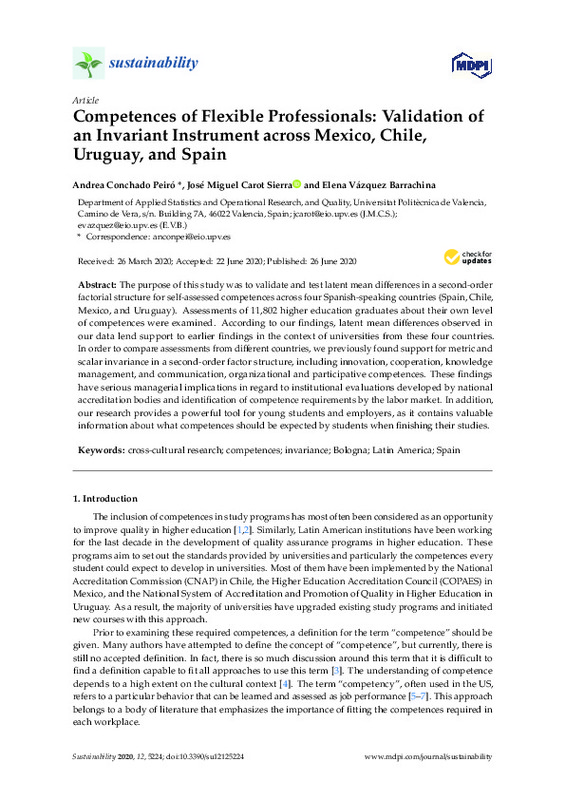Le Deist, F. D., & Winterton, J. (2005). What Is Competence? Human Resource Development International, 8(1), 27-46. doi:10.1080/1367886042000338227
Cseh, M. (2003). Facilitating Learning in Multicultural Teams. Advances in Developing Human Resources, 5(1), 26-40. doi:10.1177/1523422302239181
McClelland, D. C. (1998). Identifying Competencies with Behavioral-Event Interviews. Psychological Science, 9(5), 331-339. doi:10.1111/1467-9280.00065
[+]
Le Deist, F. D., & Winterton, J. (2005). What Is Competence? Human Resource Development International, 8(1), 27-46. doi:10.1080/1367886042000338227
Cseh, M. (2003). Facilitating Learning in Multicultural Teams. Advances in Developing Human Resources, 5(1), 26-40. doi:10.1177/1523422302239181
McClelland, D. C. (1998). Identifying Competencies with Behavioral-Event Interviews. Psychological Science, 9(5), 331-339. doi:10.1111/1467-9280.00065
Winterton, J. (2009). Competence across Europe: highest common factor or lowest common denominator? Journal of European Industrial Training, 33(8/9), 681-700. doi:10.1108/03090590910993571
Shavelson, R. J. (2010). On the measurement of competency. Empirical Research in Vocational Education and Training, 2(1), 41-63. doi:10.1007/bf03546488
Lozano, R., Merrill, M., Sammalisto, K., Ceulemans, K., & Lozano, F. (2017). Connecting Competences and Pedagogical Approaches for Sustainable Development in Higher Education: A Literature Review and Framework Proposal. Sustainability, 9(10), 1889. doi:10.3390/su9101889
Zamora-Polo, F., Sánchez-Martín, J., Corrales-Serrano, M., & Espejo-Antúnez, L. (2019). What Do University Students Know about Sustainable Development Goals? A Realistic Approach to the Reception of this UN Program Amongst the Youth Population. Sustainability, 11(13), 3533. doi:10.3390/su11133533
Mochizuki, Y., & Fadeeva, Z. (2010). Competences for sustainable development and sustainability. International Journal of Sustainability in Higher Education, 11(4), 391-403. doi:10.1108/14676371011077603
Lambrechts, W., Mulà, I., Ceulemans, K., Molderez, I., & Gaeremynck, V. (2013). The integration of competences for sustainable development in higher education: an analysis of bachelor programs in management. Journal of Cleaner Production, 48, 65-73. doi:10.1016/j.jclepro.2011.12.034
Vandenberg, R. J., & Lance, C. E. (2000). A Review and Synthesis of the Measurement Invariance Literature: Suggestions, Practices, and Recommendations for Organizational Research. Organizational Research Methods, 3(1), 4-70. doi:10.1177/109442810031002
Heine, S. J., Lehman, D. R., Peng, K., & Greenholtz, J. (2002). What’s wrong with cross-cultural comparisons of subjective Likert scales?: The reference-group effect. Journal of Personality and Social Psychology, 82(6), 903-918. doi:10.1037/0022-3514.82.6.903
Morse, B. J., Weinhardt, J. M., Griffeth, R. W., & de Oliveira, M. Z. (2014). Cross-cultural Measurement Invariance of the Employment Opportunity Index (EOI) in Mexican and Brazilian Professionals. International Journal of Selection and Assessment, 22(2), 139-148. doi:10.1111/ijsa.12064
Heijke, H., Meng, C., & Ramaekers, G. (2003). An investigation into the role of human capital competences and their pay‐off. International Journal of Manpower, 24(7), 750-773. doi:10.1108/01437720310502113
Semeijn, J. H., Velden, R. van der, Heijke, H., Vleuten, C. van der, & Boshuizen, H. P. A. (2006). Competence indicators in academic education and early labour market success of graduates in health sciences. Journal of Education and Work, 19(4), 383-413. doi:10.1080/13639080600867158
Billing, D. (2007). Teaching for transfer of core/key skills in higher education: Cognitive skills. Higher Education, 53(4), 483-516. doi:10.1007/s10734-005-5628-5
Usher, E. L., & Pajares, F. (2007). Self-Efficacy for Self-Regulated Learning. Educational and Psychological Measurement, 68(3), 443-463. doi:10.1177/0013164407308475
Hernández‐March, J., Martín del Peso, M., & Leguey, S. (2009). Graduates’ Skills and Higher Education: The employers’ perspective. Tertiary Education and Management, 15(1), 1-16. doi:10.1080/13583880802699978
Smits, W. (2007). Industry-specific or generic skills? Conflicting interests of firms and workers. Labour Economics, 14(3), 653-663. doi:10.1016/j.labeco.2006.09.002
Garcia‐Aracil, A., Mora, J., & Vila, L. E. (2004). The rewards of human capital competences for young European higher education graduates. Tertiary Education and Management, 10(4), 287-305. doi:10.1080/13583883.2004.9967133
García-Aracil, A., & Van der Velden, R. (2007). Competencies for young European higher education graduates: labor market mismatches and their payoffs. Higher Education, 55(2), 219-239. doi:10.1007/s10734-006-9050-4
Conchado, A., Carot, J. M., & Bas, M. C. (2015). Competencies for knowledge management: development and validation of a scale. Journal of Knowledge Management, 19(4), 836-855. doi:10.1108/jkm-10-2014-0447
Yuan, K.-H., & Bentler, P. M. (2000). 5. Three Likelihood-Based Methods for Mean and Covariance Structure Analysis with Nonnormal Missing Data. Sociological Methodology, 30(1), 165-200. doi:10.1111/0081-1750.00078
Gerbing, D. W., & Anderson, J. C. (1985). The Effects of Sampling Error and Model Characteristics on Parameter Estimation for Maximum Likelihood Confirmatory Factor Analysis. Multivariate Behavioral Research, 20(3), 255-271. doi:10.1207/s15327906mbr2003_2
Hu, L., & Bentler, P. M. (1999). Cutoff criteria for fit indexes in covariance structure analysis: Conventional criteria versus new alternatives. Structural Equation Modeling: A Multidisciplinary Journal, 6(1), 1-55. doi:10.1080/10705519909540118
Browne, M. W., & Cudeck, R. (1992). Alternative Ways of Assessing Model Fit. Sociological Methods & Research, 21(2), 230-258. doi:10.1177/0049124192021002005
Steiger, J. H. (1990). Structural Model Evaluation and Modification: An Interval Estimation Approach. Multivariate Behavioral Research, 25(2), 173-180. doi:10.1207/s15327906mbr2502_4
Chen, F. F., Sousa, K. H., & West, S. G. (2005). Teacher’s Corner: Testing Measurement Invariance of Second-Order Factor Models. Structural Equation Modeling: A Multidisciplinary Journal, 12(3), 471-492. doi:10.1207/s15328007sem1203_7
Cheung, G. W., & Rensvold, R. B. (2002). Evaluating Goodness-of-Fit Indexes for Testing Measurement Invariance. Structural Equation Modeling: A Multidisciplinary Journal, 9(2), 233-255. doi:10.1207/s15328007sem0902_5
Hong, S., Malik, M. L., & Lee, M.-K. (2003). Testing Configural, Metric, Scalar, and Latent Mean Invariance Across Genders in Sociotropy and Autonomy Using a Non-Western Sample. Educational and Psychological Measurement, 63(4), 636-654. doi:10.1177/0013164403251332
Hancock, G. R. (2001). Effect size, power, and sample size determination for structured means modeling and mimic approaches to between-groups hypothesis testing of means on a single latent construct. Psychometrika, 66(3), 373-388. doi:10.1007/bf02294440
[-]









